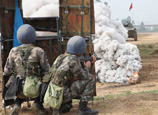
In other situations, if Kim and his colleagues find out that the iPhone is sent to a maintenance service center, either for unlocking or changing parts, and can get the address of the center, you are in luck. All you have to do then is call the police and take them down there to retrieve the phone.
That was how Yin got back one of his phones. On December 1, less than a month after the burglary, Yin's stolen iPhone was located at Bybon Mobile Service's Tiantongyuan store in Shunyi district.
After one month of efforts, visiting the center and calling the police again and again, in order to push them harder to provide relevant documents, Yin was finally reunited with his iPhone January 3. He's still holding out hope for the other one.
"Based on my experience, about 15 percent of them can get their iPhones back," said Kim. However, iPhone retrieved or not, Kim does not give refunds, since his business only provides techniques and information relevant to retrieval, and many factors out of their hands influence the final results.
Apple's iCloud and several other apps can also locate lost or stolen iPhones, but only until the phones are unlocked, which is often the first step of thieves.
Act fast
Li Ping's iPhone was stolen on October 30 at the Chairman Mao Memorial Hall. Li, 40, was there as a tourist from Shanghai, and he called 110 right away.
But the Beijing police told him there was little they could do. Li, who works in corporate management, bought a retrieval service from Kim, and then found out that his iPhone was unlocked within one hour after the theft. "The thief made a quick move," Li said.
















 Spring Festival draws near, immigrant workers have begun to go home, leading a travel peak at the railway station.
Spring Festival draws near, immigrant workers have begun to go home, leading a travel peak at the railway station.


![]()
